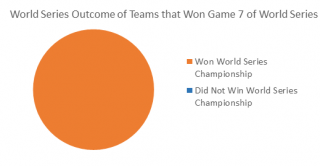As Major League Baseball hands out its individual awards, we are reminded of the emotional rollercoaster that was the 2014 MLB season. Not many expected the San Francisco Giants to capture baseball’s ultimate title, as they were the lowest seeded team in the National League playoffs. However, just how unexpected was the Giants’ run to World Series glory? A study by the Satire V Statistics Bureau found that approximately 100% of teams who win Game 7 of the World Series go on to capture that year’s World Series Championship. Combine that with the fact that the Giants did in fact win Game 7 of the World Series this year, and their unlikely run does not seem so unlikely after all.
If this seems too extreme to be true, one must only look at past World Series to see specific examples of this phenomenon occurring quite often.
October 28, 2011: Allen Craig’s home run in the 3rd inning of Game 7 of the World Series led the St. Louis Cardinals to a 6-2 victory over the Texas Rangers. The Cardinals also won the World Series Championship that year.
October 27, 2002: The Anaheim Angels scored 3 runs in the 3rd inning en route to a 4-1 win over the San Francisco Giants in Game 7 of the World Series. The Angels managed to capture the World Series title that year as well.
November 4, 2001: Luis Gonzalez hit a walk-off single off Mariano Rivera, giving the Arizona Diamondbacks a 3-2 victory over the New York Yankees in Game 7 of the World Series. Many remember this hit not only as the turning point of game 7, but also as the turning point of the entire series, as the Diamondbacks went on to win the World Series Championship that year.
October 27, 1986: New York Mets pitcher Jesse Orosco tossed two perfect innings in Game 7 of the World Series after being called upon in the 8th inning to relieve Roger McDowell. The Mets led 6-5 at the time, but the Boston Red Sox were threatening, with a man on second base and no outs, having already scored two runs in the inning. With Orosco’s nerves of steel, the Mets won game 7 of the World Series by a score of 6-5, and managed to seize the World Series title that year as well. Bill Buckner contributed two hits for the Red Sox in Game 7.
Looking at concrete examples, it becomes clear that this coincidence may not be a coincidence after all. Even without the fancy mathematical equations and algorithms used to prove the existence of this trend, one can intuitively see that a relationship exists between teams winning Game 7 of the World Series and teams winning the World Series Championship that year.
There is some evidence to suggest that this trend exists in sports besides baseball, as many have reported that teams winning Game 7 of the Stanley Cup Finals often win the Stanley Cup. However, this evidence is largely anecdotal and has not been rigorously tested. Furthermore, some have proposed the theory that the team that wins Game 5 in a best-of-5 series tends to win the series. While an interesting topic for debate, that argument is outside the scope of this study, as we are only concerned with best-of-7 series and their implications.



